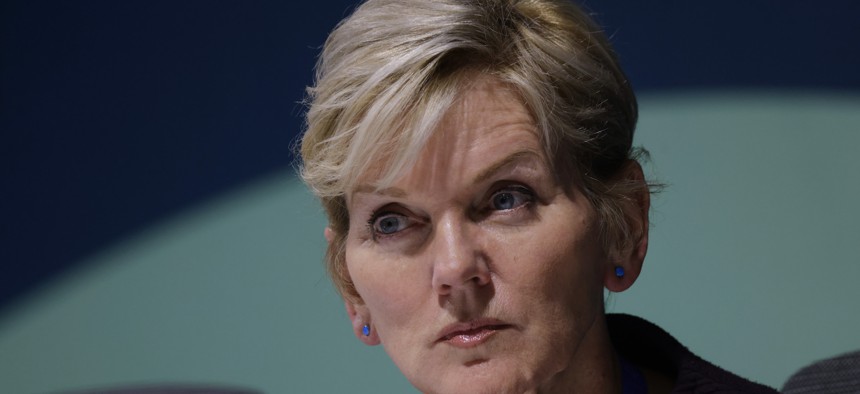
Energy Secretary Jennifer Granholm at the UNFCCC COP29 Climate Conference on Nov. 15, 2024, in Baku, Azerbaijan. Republicans have scrutinized an EV road trip she took in 2023. Sean Gallup / Getty Images
Energy Dept. watchdog reports that travel expense violations in secretary’s criticized EV road trip caused by lack of oversight and knowledge
House Republicans blasted the trip as “ripe with waste, fraud and abuse,” but the report found that some of the violations cost the federal government less than $100.
The Energy Department Office of Inspector General on Wednesday published a report that found government staffers exceeded travel spending limitations and broke certain related policies during a summer 2023 electric vehicle multi-state road trip with the secretary to tout President Joe Biden’s clean energy initiatives.
Investigators determined that 36 out of 42 travel vouchers associated with the trip had lodging expenses that exceeded federal per diem rates, which vary depending on location and set amounts employees can spend during official travel.
Ultimately, such expenses exceeded the rates by a total of nearly $9,500. However, none of the vouchers exceeded the maximum allowable limitation for reimbursement, which is 300% of the applicable maximum per diem rate.
The OIG reported that staff could have picked different nearby hotels that cost less, but DOE officials said they had difficulties finding hotels with functioning EV chargers onsite or nearby. Investigators pointed out that not all of the vehicles for the trip were EVs.
The report also found that DOE employees did not address or adequately respond to travel voucher audit warnings regarding potential deviations from travel requirements.
Investigators discovered other travel violations that generally cost the government small amounts of money.
For example, there were four vouchers where employees did not use their government-issued travel cards for expenses, as required. Two individuals forgot their cards at home and another had already reached the card’s credit limit due to a two-month detail. These violations cost the government approximately $51.
Regarding different DOE trips, the OIG found 15 instances where employees exceeded the allowable tip amount of up to 15% for taxis. The amounts exceeding such a limit ranged from $0.10 to $7.35.
The OIG said the identified issues with the EV trip occurred because there were inadequate reviews of travel vouchers and a lack of knowledge about federal travel requirements.
“Department personnel, including those traveling with the secretary, have a duty to be conscientious stewards of taxpayer funds,” investigators wrote. “Conscientious stewardship is particularly crucial for matters involving high publicity. Personnel must ensure that resources are used appropriately, cost-effectively and only as necessary to fulfill the department’s mission.”
Investigators recommended that the chief of staff in the Office of the Energy Secretary ensure traveling employees and approving officials adequately review travel authorizations and vouchers for accuracy and receive refresher training on related requirements and responsibilities.
DOE concurred with the recommendations and said it already has reminded offices about existing travel expense requirements and, by March 31, would provide such refresher training to officials.
“While the department plans to take additional actions to improve controls regarding the approval of travel, DOE notes that the exhaustive OIG review did not identify significant areas of noncompliance, substantive financial impacts or systemic concerns,” Chief of Staff Christopher Davis wrote in a letter attached to the report.
Republicans on the House Oversight and Government Reform Committee, which requested the report, argued it showed the EV road trip was “ripe with waste, fraud and abuse.”
DOE spent $58.8 million on official travel in fiscal 2023.







